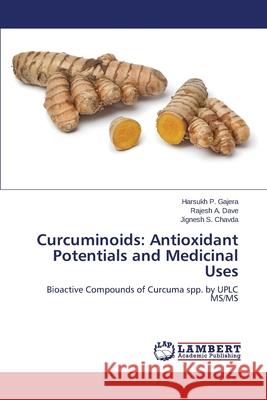Curcuminoids: Antioxidant Potentials and Medicinal Uses » książka
Curcuminoids: Antioxidant Potentials and Medicinal Uses
ISBN-13: 9783659534225 / Angielski / Miękka / 2015 / 68 str.
Curcumin is a phenolic pigment obtained from powdered rhizomes of Curcuma longa Linn. (Family: Zinziberaceae). Curcumin is the main active constituent of C. longa L. It is imperative to know the different size of their rhizomes which contain the highest quantity of main three active constituent (curcumin, desmethoxycurcumin and bisdesmethoxycurcumin). A Validated UPLC-MS/MS method has been developed for the isolation and quantification of three main curcumin in different sizes of rhizomes of C. longa and C. amada collected from market. The proposed method is simple, precise, specific, accurate, less time consuming and cost effective. Statistical analysis proved that the method is evitable for the analysis of three main curcumin. The phenolic compounds could be a major determinant of antioxidant potentials of foods. The results showed that there was significant negative correlation between the total phenol and IC50 of antioxidant activity. It can be concluded that high content of curcuminoids showed the better antioxidant activity. The larger size of rhizomes of Curcuma species gave higher yield of curcuminoids.
Curcumin is a phenolic pigment obtained from powdered rhizomes of Curcuma longa Linn. (Family: Zinziberaceae). Curcumin is the main active constituent of C. longa L. It is imperative to know the different size of their rhizomes which contain the highest quantity of main three active constituent (curcumin, desmethoxycurcumin and bisdesmethoxycurcumin). A Validated UPLC-MS/MS method has been developed for the isolation and quantification of three main curcumin in different sizes of rhizomes of C. longa and C. amada collected from market. The proposed method is simple, precise, specific, accurate, less time consuming and cost effective. Statistical analysis proved that the method is evitable for the analysis of three main curcumin. The phenolic compounds could be a major determinant of antioxidant potentials of foods. The results showed that there was significant negative correlation between the total phenol and IC50 of antioxidant activity. It can be concluded that high content of curcuminoids showed the better antioxidant activity. The larger size of rhizomes of Curcuma species gave higher yield of curcuminoids.











